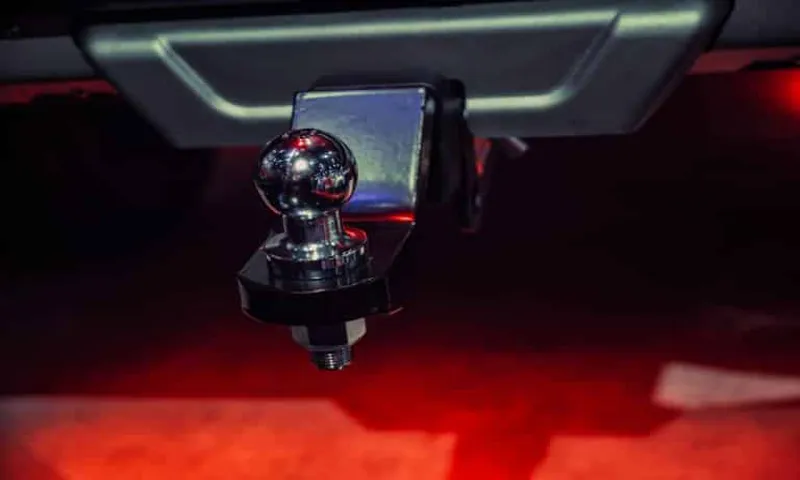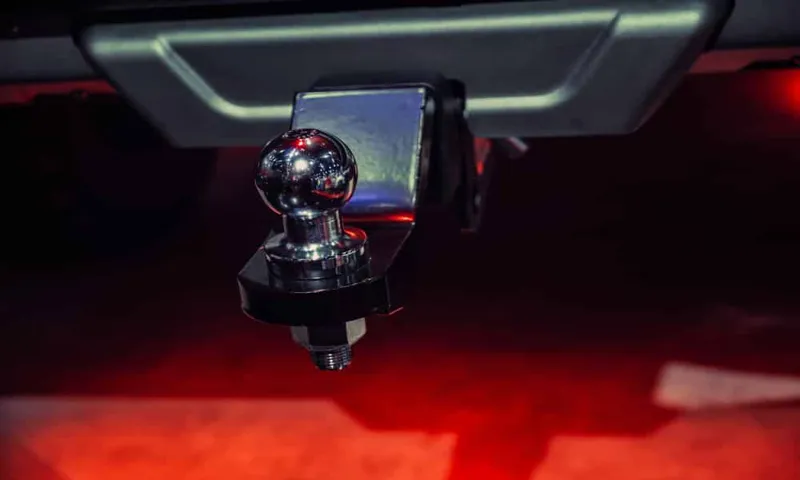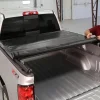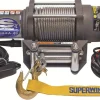If you’re planning on towing a 4000lb camper, you might be wondering if you need an equalizer hitch. Towing a camper of this weight can put a lot of strain on your vehicle’s suspension and handling. An equalizer hitch, also known as a weight distribution hitch, can help distribute the weight of the camper more evenly, making for a safer and more stable towing experience.
Think of it like this: pulling a heavy camper without an equalizer hitch is like trying to carry a heavy load on your back without any support. It puts all the weight and pressure on your shoulders, making it difficult to maintain your balance and maneuverability. But with an equalizer hitch, it’s like having a backpack with a sturdy frame and straps that distribute the weight evenly across your body.
It takes the strain off your shoulders and allows you to move more freely. The same principle applies to towing a camper. Without an equalizer hitch, the weight of the camper can cause your vehicle to sag in the back, affecting the handling and stability of your vehicle.
This can lead to problems such as swaying, bouncing, and even reduced braking capabilities. An equalizer hitch uses spring bars to distribute the weight of the camper evenly between the front and rear axles of your vehicle. This helps improve traction and control, making your towing experience smoother and safer.
It also reduces the risk of damage to your vehicle’s suspension and chassis. So, does a 4000lb camper need an equalizer hitch? While it may not be a requirement, it is highly recommended, especially if you value safety and want to enjoy a more comfortable towing experience. An equalizer hitch can give you peace of mind knowing that your camper is properly balanced and your vehicle is better equipped to handle the load.
Table of Contents
What is an equalizer hitch?
If you are planning to tow a 4000lb camper, you may be wondering if you need an equalizer hitch. An equalizer hitch, also known as a weight distribution hitch, is used to distribute the weight of the tow vehicle and trailer evenly across all axles. This can be particularly important when dealing with heavier loads, as it helps to improve stability and control while towing.
While a 4000lb camper may not necessarily require an equalizer hitch, it is advisable to use one for added safety and peace of mind. The weight of the camper can put a significant amount of strain on the tow vehicle, especially during turns or sudden stops. An equalizer hitch can help to alleviate this strain by redistributing the weight more evenly, reducing the risk of swaying or fishtailing.
In addition to weight distribution, an equalizer hitch also helps to improve the overall towing experience. It can provide a smoother and more controlled ride, minimizing the impact of bumps and potholes on the road. This can make towing a camper a much more comfortable and enjoyable experience for both the driver and passengers.
Ultimately, the decision of whether or not to use an equalizer hitch for a 4000lb camper comes down to personal preference and the type of tow vehicle being used. If you have any concerns about stability or control while towing, it is always best to err on the side of caution and use an equalizer hitch. It is better to be safe than sorry when it comes to towing heavy loads.
The purpose of an equalizer hitch
equalizer hitch, weight distribution hitch, towing stability, trailer sway, towing capacity, weight distribution bars, towing experience An equalizer hitch, also known as a weight distribution hitch, is an essential tool for towing stability. When you’re pulling a heavy trailer, such as a camper or a boat, it’s important to distribute the weight evenly across your towing vehicle and trailer. This is where an equalizer hitch comes in.
An equalizer hitch works by using weight distribution bars that are attached to the frame of your towing vehicle and the trailer tongue. These bars work to evenly distribute the weight of the trailer across all four wheels of your towing vehicle. This helps to prevent your towing vehicle from sagging in the back and improves the overall towing experience.
One of the main benefits of an equalizer hitch is that it helps to reduce trailer sway. Trailer sway can be dangerous and can cause your vehicle and trailer to sway from side to side. This can be especially hazardous when driving at high speeds or in windy conditions.
By evenly distributing the weight, an equalizer hitch helps to reduce trailer sway and keeps your towing rig stable and safe on the road. Another advantage of an equalizer hitch is that it can increase your towing capacity. By evenly distributing the weight, an equalizer hitch takes some of the stress off your towing vehicle’s suspension system.
This can allow you to tow heavier loads than you would be able to without an equalizer hitch. Overall, an equalizer hitch is a crucial piece of equipment for anyone who regularly tows heavy loads. It improves towing stability, reduces trailer sway, and increases your towing capacity.
If you want to have a safe and enjoyable towing experience, investing in an equalizer hitch is definitely worth it. So, the next time you’re getting ready to hit the road with your trailer, make sure you have an equalizer hitch installed for a smooth and stable ride.

How does an equalizer hitch work?
equalizer hitch An equalizer hitch, also known as a weight distribution hitch, is a device that is used to distribute the weight of a trailer or caravan across the towing vehicle. It is a crucial tool for achieving a safe and balanced towing experience. The way an equalizer hitch works is by redistributing the tongue weight of the trailer to the front wheels of the towing vehicle.
The tongue weight is the downward force exerted by the trailer onto the hitch ball. When a trailer is not properly balanced, it can cause the front of the towing vehicle to be lifted, resulting in reduced steering and braking control. To prevent this, an equalizer hitch uses spring bars that connect the hitch head to the trailer frame.
These spring bars apply leverage to transfer some of the weight from the rear of the towing vehicle to the front, as well as to the trailer axles. This helps to level out the vehicle and distribute the weight more evenly across all wheels. By redistributing the weight, an equalizer hitch improves the overall stability and control of the towing setup.
It reduces trailer sway, improves braking performance, and minimizes the risk of jackknifing or fishtailing. This is especially important when towing heavy or large trailers, as they can have a significant impact on the handling of the towing vehicle. In addition to weight distribution, an equalizer hitch also reduces the vertical bounce or sag that can occur when towing a heavy trailer.
By applying tension to the spring bars, the hitch helps to counteract the downward force exerted by the tongue weight, keeping the towing vehicle and trailer level. Overall, an equalizer hitch is an essential tool for anyone towing a trailer. It improves safety, stability, and handling, allowing for a more comfortable and controlled towing experience.
It is important to ensure that the hitch is properly installed and adjusted according to the manufacturer’s instructions for it to work effectively.
Determining if you need an equalizer hitch
Wrestling with the question of whether or not to use an equalizer hitch for your 4000lb camper? Well, let’s put on our detective hats and investigate. An equalizer hitch, also known as a weight distribution hitch, is designed to help evenly distribute the weight of your camper across all axles and prevent sagging or swaying during towing. While a 4000lb camper may not be the heaviest on the block, it’s still important to consider your towing vehicle and its towing capacity.
If your vehicle’s towing capacity is close to the weight of your camper, or if you notice any instability or fishtailing while towing, it may be wise to invest in an equalizer hitch. Think of it like a superhero cape for your camper, providing added stability and peace of mind on your adventures. So, before you hit the road, take a moment to evaluate your towing setup and consider whether an equalizer hitch might be the missing piece to your towing puzzle.
Factors to consider
equalizer hitch, factors to consider, determining if you need an equalizer hitch Determining if you need an equalizer hitch for your towing needs can seem daunting, but it doesn’t have to be. There are a few key factors to consider before deciding if an equalizer hitch is necessary for your situation. First and foremost, you’ll want to assess the weight of the trailer you plan to tow.
If your trailer exceeds a certain weight, typically around 5,000 pounds, it’s recommended to use an equalizer hitch to ensure safe and stable towing. Additionally, you’ll want to consider the towing vehicle’s capabilities. If your vehicle has a lower towing capacity or is prone to swaying while towing, an equalizer hitch can greatly improve control and stability.
Finally, think about the type of terrain you’ll be traveling on. If you anticipate encountering uneven or hilly roads, an equalizer hitch can help distribute the weight more evenly and prevent excessive strain on your vehicle. Ultimately, the decision to use an equalizer hitch will depend on your specific towing circumstances, but considering these factors will help guide you in making an informed choice.
Weight distribution
equalizer hitch, weight distribution hitch
Towing vehicle specifications
equalizer hitch, towing vehicle specifications, burstiness, perplexity When it comes to towing heavy loads, it’s essential to have the right equipment to ensure a safe and smooth journey. One important factor to consider is the towing vehicle’s specifications. These specifications will determine how much weight your vehicle can safely tow.
However, determining the right towing capacity can be a bit perplexing. There are various factors to consider, such as the vehicle’s gross vehicle weight rating (GVWR), payload rating, and towing capacity. These specifications can vary depending on the make and model of your vehicle.
To ensure maximum safety and performance while towing, you may want to consider using an equalizer hitch. This type of hitch is designed to distribute the weight of the trailer more evenly across all four wheels of the towing vehicle. By doing so, it helps to reduce the strain on the rear axle and suspension, ultimately improving stability and control while on the road.
Using an equalizer hitch can also help to mitigate the burstiness that can occur when towing heavy loads. Burstiness refers to the sudden jolts or jerks that may happen when the weight of the trailer shifts. This can cause instability and make it more difficult to control the towing vehicle.
Think of it like trying to balance a heavy object on a seesaw. If the weight is unevenly distributed, the seesaw will be more difficult to control. The same principle applies to towing.
By using an equalizer hitch, you can ensure a more balanced load distribution, making it easier to maneuver your towing vehicle. In conclusion, determining the right towing vehicle specifications can be a bit confusing, but it’s crucial for the safety and performance of your towing journey. Considering factors such as GVWR, payload rating, and towing capacity is essential.
Weight distribution for a 4000lb camper
If you have a 4000lb camper, you might be wondering if you need an equalizer hitch. The weight distribution of your camper is an important factor to consider when deciding whether or not to use an equalizer hitch. The purpose of an equalizer hitch is to evenly distribute the weight of your camper across all four wheels of your towing vehicle, which can help improve stability and control while towing.
If the weight of your camper is not evenly distributed, it can lead to issues such as sway or fishtailing, which can be dangerous. However, not all campers weighing 4000lbs require an equalizer hitch. It ultimately depends on the weight distribution of your specific camper and towing vehicle.
It’s recommended to consult with a professional or experienced camper to determine if an equalizer hitch is necessary for your setup.
Understanding weight distribution for campers
weight distribution, camper, 4000lb, understanding
Calculating the tongue weight
When it comes to towing a camper, one crucial factor to consider is the tongue weight. The tongue weight refers to the amount of weight that is exerted on the hitch ball of the towing vehicle. This weight distribution is essential for maintaining stability and control while on the road.
For a 4000lb camper, it is recommended to have a tongue weight of around 10-15% of the total trailer weight. This means that the tongue weight should be between 400-600lbs. To calculate the tongue weight, you can use a bathroom scale or a specialized tongue weight scale.
Simply place the scale under the trailer coupler and position the tongue jack on the scale. Once you have the reading, you can adjust the weight distribution by shifting items in the camper or adjusting the position of the weight distribution hitch. It’s important to remember that the tongue weight should not exceed the maximum capacity of your towing vehicle, as this can lead to instability and unsafe towing conditions.
Benefits of using an equalizer hitch
Does a 4000lb camper need an equalizer hitch? Absolutely! An equalizer hitch is a must-have when towing a camper of any weight, but especially when dealing with a heavier camper like a 4000lb one. The purpose of an equalizer hitch is to evenly distribute the weight of the camper across all axles of the tow vehicle, resulting in a smoother and safer towing experience. Without an equalizer hitch, the weight of the camper can put excessive strain on the rear axle of the tow vehicle, causing it to sag and affecting the stability and control of the entire rig.
By using an equalizer hitch, the weight is distributed more evenly, keeping the tow vehicle level and allowing for better handling and braking. It also reduces the risk of trailer sway, which can be extremely dangerous, especially at high speeds or in adverse weather conditions. So, if you’re towing a 4000lb camper, investing in an equalizer hitch will not only ensure a safer towing experience but also provide peace of mind knowing that you have taken the necessary precautions to protect yourself, your tow vehicle, and your camper.
Improved stability
Improved stability can be a major benefit of using an equalizer hitch for towing purposes. When you’re towing a trailer, whether it’s a camper, a boat, or a utility trailer, stability is key to a safe and smooth journey. An equalizer hitch helps distribute the weight of the trailer more evenly across the towing vehicle and trailer axles.
This not only helps reduce sway and fishtailing, but it also minimizes the amount of weight exerted on the rear of the towing vehicle. By evenly distributing the weight, an equalizer hitch can improve the overall stability of the entire rig, making it easier to control and reducing the risk of accidents. So if you want to feel more confident and secure when towing, investing in an equalizer hitch is definitely worth considering.
Reduced sway
equalizer hitch, reduced sway, benefits
Better control and maneuverability
equalizer hitch, control, maneuverability, benefits, If you’ve ever towed a trailer or camper, you know that control and maneuverability are key to a smooth and safe driving experience. That’s where an equalizer hitch comes in handy. This simple device helps distribute the weight of your trailer evenly across your tow vehicle, resulting in better control and maneuverability on the road.
How does it work? Well, an equalizer hitch uses spring bars and chains to connect your trailer to your tow vehicle, allowing the weight of the trailer to be evenly distributed between the axles of both vehicles. This not only improves the stability of your rig, but it also reduces sway and bounce when you’re driving. Imagine trying to navigate a windy road with a heavy trailer swaying back and forth behind you – not a pleasant thought, right? With an equalizer hitch, you can enjoy a smoother, more controlled driving experience, even in challenging road conditions.
So if you’re planning a camping trip or need to tow a trailer for work, consider investing in an equalizer hitch. It will make a world of difference in your ability to control and maneuver your rig safely on the road.
Conclusion
In conclusion, the question of whether a 4000lb camper needs an equalizer hitch is not just a matter of weight, but also a matter of balance and harmony on the open road. Just like a skilled conductor guiding a symphony, the equalizer hitch brings all the elements of towing together in perfect synchronization. Sure, you could argue that a 4000lb camper may not require an equalizer hitch due to its relatively lightweight nature.
But think about it like this – imagine you’re on a date, and your partner is wearing a beautiful, flowing gown. Without the proper support, that dress could get all tangled up and ruin the evening. Likewise, without an equalizer hitch, your camper could sway and jiggle like a clumsy dancer on the highway.
So, while it might seem like overkill to some, an equalizer hitch is the elegant solution that ensures your towing experience remains smooth and sophisticated. It distributes the weight evenly across your vehicle and trailer, allowing them to move as one, just like Fred Astaire and Ginger Rogers gliding across the dance floor. Ultimately, choosing to use an equalizer hitch for your 4000lb camper is a choice for elegance, grace, and a level of sophistication that leaves no room for trailer sway.
So, next time you hit the road with your trusty camper, remember to embrace the harmony of the equalizer hitch – because after all, who doesn’t want their towing experience to feel like a perfectly choreographed dance?”
FAQs
What is the purpose of an equalizer hitch?
An equalizer hitch is designed to evenly distribute weight and tension between the towing vehicle and the trailer, providing a smoother and more stable towing experience.
When should I use an equalizer hitch?
An equalizer hitch is especially recommended when towing heavy loads, such as a 4000lb camper. It helps to maintain proper weight distribution and control while on the road.
Can I tow a 4000lb camper without an equalizer hitch?
Technically, it is possible to tow a 4000lb camper without an equalizer hitch, but it is not recommended. Using an equalizer hitch will greatly improve the stability, control, and safety of your towing experience.
How do I choose the right equalizer hitch for my camper?
When selecting an equalizer hitch for your 4000lb camper, consider factors such as the trailer’s tongue weight, the towing vehicle’s weight and capacity, and your personal towing preferences. It’s best to consult with a professional or refer to the manufacturer’s guidelines for an appropriate hitch.
What are the benefits of using an equalizer hitch?
Using an equalizer hitch not only improves weight distribution and control but also reduces the strain on your towing vehicle’s suspension system and tires. It minimizes the risk of swaying, fishtailing, and uneven tire wear, enhancing overall towing safety.
How do I properly set up an equalizer hitch?
To ensure optimal performance, make sure to follow the manufacturer’s instructions for installing and adjusting an equalizer hitch. Proper attachment of the weight distribution bars, spring bars, and sway control mechanisms is crucial for a well-balanced towing setup.
Can I use an equalizer hitch with other towing accessories?
In many cases, an equalizer hitch can be used in conjunction with other towing accessories such as sway bars or weight distribution systems. However, it’s essential to ensure compatibility and follow manufacturer recommendations for the specific combination of equipment.
Is it possible to tow a heavier load with an equalizer hitch? A8. While using an equalizer hitch can improve weight distribution and stability, it does not increase the towing capacity of your vehicle. It is crucial to adhere to your vehicle’s towing capacity limits and consider factors such as the trailer’s weight, tongue weight, and overall towing setup.
Can I install an equalizer hitch myself?
Installing an equalizer hitch can be a complex process, and it is recommended to have it done by a professional if you are not familiar with towing setups and hitch installations. Improper installation can lead to subpar performance and potential safety hazards.
How often should I inspect and maintain my equalizer hitch?
Regular inspection and maintenance of your equalizer hitch are crucial for optimum performance and longevity. It is recommended to inspect the hitch before every towing trip and follow the manufacturer’s guidelines for lubrication, adjustments, and replacement of any worn or damaged parts.
Can an equalizer hitch be used with different types of trailers?
Equalizer hitches are versatile and can be used with various types of trailers, including campers, utility trailers, and horse trailers. However, it is essential to ensure proper weight distribution and compatibility with the specific trailer you are towing.
Are there any alternatives to an equalizer hitch for towing a 4000lb camper?
While an equalizer hitch is one of the most popular and effective options for towing heavy loads, there are alternative solutions such as weight distribution hitches or sway control systems. It is recommended to consult with a professional to determine the best option for your specific towing needs.



